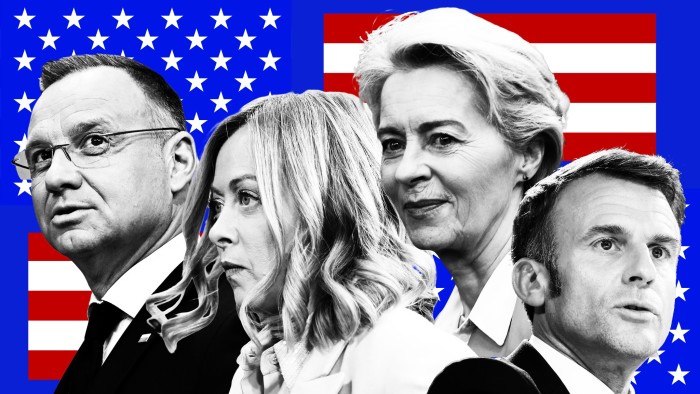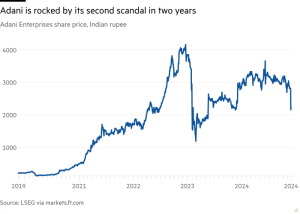world leaders dust off their Trump playbooks

By the time Shinzo Abe and Donald Trump teed off at the Mobara Country Club south-east of Tokyo in May 2019, it was the fifth time the two had played golf together. Diplomatic triumphs, as Japan’s current prime minister Shigeru Ishiba is about to discover, are a relentless slog.
The pictures from Mobara showed two good friends enjoying the spring sunshine; the atmosphere on the back of the golf cart was described by Japan’s foreign ministry as “cosy”. Lunch in the clubhouse was a double cheeseburger — made with US beef.
During Trump’s first term, Abe was universally acknowledged to have delivered a masterclass on handling the mercurial US president-elect. The lessons are being studied by a new generation of leaders who realise that Trump’s easily aggrieved personality will be as important a factor as political measures and economic inducements in dealing with his second administration.
The basic elements of a Trump strategy: flattery, distraction and golf. These formed Abe’s playbook from the moment that Trump was elected for the first time in 2016.
As the rest of the world reeled in disbelief, Abe scrambled on to a plane to ensure he was the first major leader to rush to the US to greet Trump on his election victory. He presented the president-elect with a gold-plated putter — the first of three clubs that Abe would give Trump during his presidency.
Abe’s deft handling of Trump is credited with averting threatened US tariffs on Japanese car imports and softening demands for Japan to pay more for its own defence.
PM Abe: Playing golf in Chiba with President Trump (@realdonaldtrump), who is visiting Japan as the first state guest in the era of Reiwa. We hope to further solidify the Japan-US alliance in the new era of Reiwa. pic.twitter.com/CsJFkAAkWr
— PM’s Office of Japan (@JPN_PMO) May 26, 2019
Many US allies are eyeing a similar strategy with Trump as they await the sharp protectionist swerve expected from Washington. The EU, as well as worrying about the future of Nato, is concerned that a stubborn €158bn annual trade surplus with the US may present a bullseye for Trump, who said last month that the “most beautiful word in the dictionary is tariff”.
To address the trade surplus, the EU should look into the prospect of increasing purchases of US liquid natural gas, European Commission president Ursula von der Leyen has said. “[LNG] is something where we can get into a discussion,” she said on Friday, noting that US LNG could replace purchases from Russia. In 2018, the EU pacified Trump — who had threatened a full-blown tariff war — by pledging to buy more US LNG and soyabeans.
Von der Leyen said this week that the EU’s approach to Trump on trade would be: “Engage, look at common interests and then negotiate.”
Leaders are taking note of what worked in the past, and what failed. Emmanuel Macron, the French president, used flattery to woo Trump, such as when he invited him to the pomp-filled Bastille Day celebrations. Trump enjoyed his experience in 2017 so much that he organised a similar military parade and fly-past in Washington two years later — though minus the tanks.
Germany’s former chancellor Angela Merkel took the opposite approach: she refused to flatter Trump, and in a statement in 2016 warned him that the future of the US-German relationship would hinge on him respecting the two countries’ “joint values” of democracy and respect for the rule of law.
“She stood her moral ground,” said Cathryn Clüver Ashbrook, an expert in US-German relations at the Bertelsmann Foundation.
However, Merkel did delve into Trump’s psyche, requiring her officials to read Trump’s interview with Playboy from 1990 in which he railed against West Germany and Japan for “flooding” US markets with their products while America underwrote their security. He said then that if he were president, he would “throw a tax on every Mercedes-Benz rolling into this country”.
Merkel’s strategy only fuelled Trump’s ire, with the US leader publicly complaining at a Nato summit in 2018 that “Germany is totally controlled by Russia” because of its gas purchases from the country, and “it’s a very bad thing for Nato”.
For Berlin, the task of handling Trump might now fall to an as yet unchosen German leader after the collapse of current Chancellor Olaf Scholz’s government.
From Poland, meanwhile, President Andrzej Duda sent his closest advisers to join the Trump celebrations in Palm Beach, Florida, on Tuesday night, Polish media reported.
Nelle scorse ore ho sentito l’amico @elonmusk. Sono convinta che il suo impegno e la sua visione potranno rappresentare un’importante risorsa per gli Stati Uniti e per l’Italia, in uno spirito di collaborazione volto ad affrontare le sfide future. pic.twitter.com/sAqHNG1kaG
— Giorgia Meloni (@GiorgiaMeloni) November 7, 2024
Italy’s rightwing Prime Minister Giorgia Meloni has made connections with Trump’s inner circle through another route: a warm personal bond with his key financier and adviser, Elon Musk, who visited Rome twice last year.
Meloni was “even more beautiful on the inside than she is on the outside” Musk gushed as he introduced her at a public event in New York last month, later rebuffing suggestions of any “romantic relationship” in a post on his X platform.
On Whitehall, meanwhile, thoughts have turned to how to leverage Trump’s affection for Scotland — his mother’s homeland and the site of his golf resort Turnberry — and his fascination with the royal family.
UK officials fear post-Brexit Britain is vulnerable to Trump’s threats to impose 10 to 20 per cent tariffs on all US imports. And foreign secretary David Lammy has struggled to build bridges with Trump’s team after referring to him in 2018 as a “woman-hating, neo-Nazi-sympathising sociopath”.
UK officials say King Charles III is likely to be enlisted in the upcoming charm offensive, mindful of the deep impression left by the late Queen Elizabeth II in 2019 when Trump was entertained at Buckingham Palace.

Despite that visit, the UK made little headway with Trump, who pushed for controversial concessions in trade talks and later publicly called then-prime minister Theresa May “foolish” in a post on Twitter, now X.
“The UK’s record of understanding and influencing Trump — based on his first term — is poor,” said Matthew Savill at the London think-tank Rusi. “A second Trump administration will have fewer senior figures in it with any sort of affinity for the UK.”
The leader with the toughest job may be Mexico’s President Claudia Sheinbaum, who will have to handle Trump’s plan to deport large numbers of undocumented Mexicans from the US while renegotiating a vital trade deal.
Her predecessor, Andrés Manuel López Obrador, created a favourable impression by calling in the national guard to help stop migrants reaching the US border. At the high point of their relationship, they exchanged gifts of baseball bats, with López Obrador handing Trump a bat decorated by indigenous Huichol artisans.
Intercambio de bates en la Casa Blanca, el béisbol es un espacio común. pic.twitter.com/gQ5JUTgHzX
— Marcelo Ebrard C. (@m_ebrard) July 8, 2020
Trump said: “We didn’t fight. We are friends and we’re going to keep being friends.” The gesture celebrated a fresh version of Mexico’s vital trade deal with the US, which has subsequently helped to make them each other’s top trading partner.
In Tokyo, where worries about the future of the US-Japan defence alliance dominate, there were hopes that newly elected Prime Minister Ishiba could replicate Abe’s success. As of Friday night, Ishiba’s plan was to see whether a planned visit to South America later this month could be interrupted for a trip to see Trump in person.
Ishiba lacks Abe’s charisma, but officials say he could play up his similarities with Trump: he draws his political strength from rural areas and is a non-establishment figure, disliked by party patricians but broadly liked by the public.
“He has more in common with Trump than you might think,” said one person close to the situation.
“There is a clear recognition among his camp,” said the same person, “that Ishiba needs to do something special, and that it matters very much to Japan as a whole that he gets it right.”
Additional reporting by Guy Chazan, Alice Hancock, Amy Kazmin in Rome, Raphael Minder in Warsaw and Leila Abboud in Paris
#world #leaders #dust #Trump #playbooks







